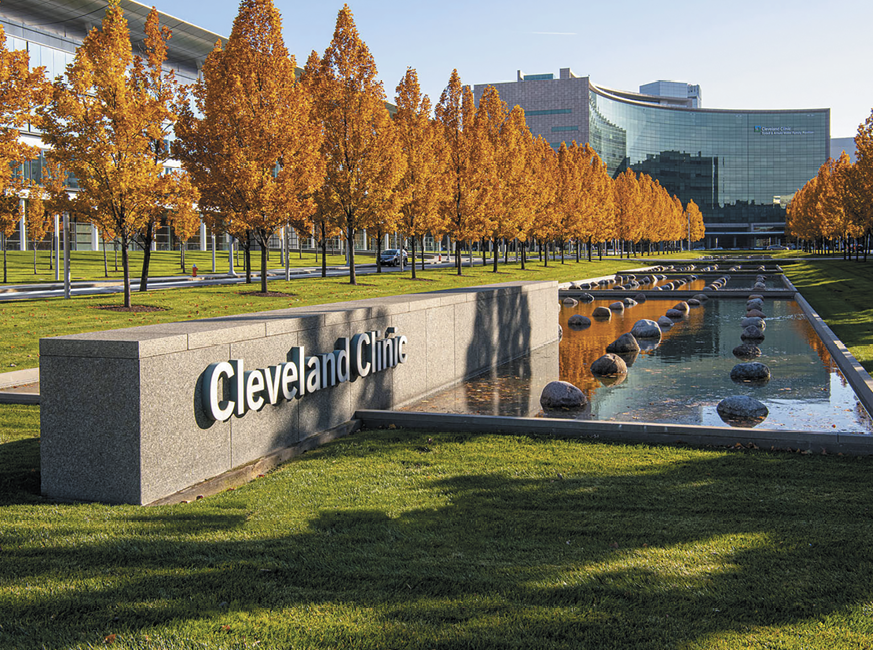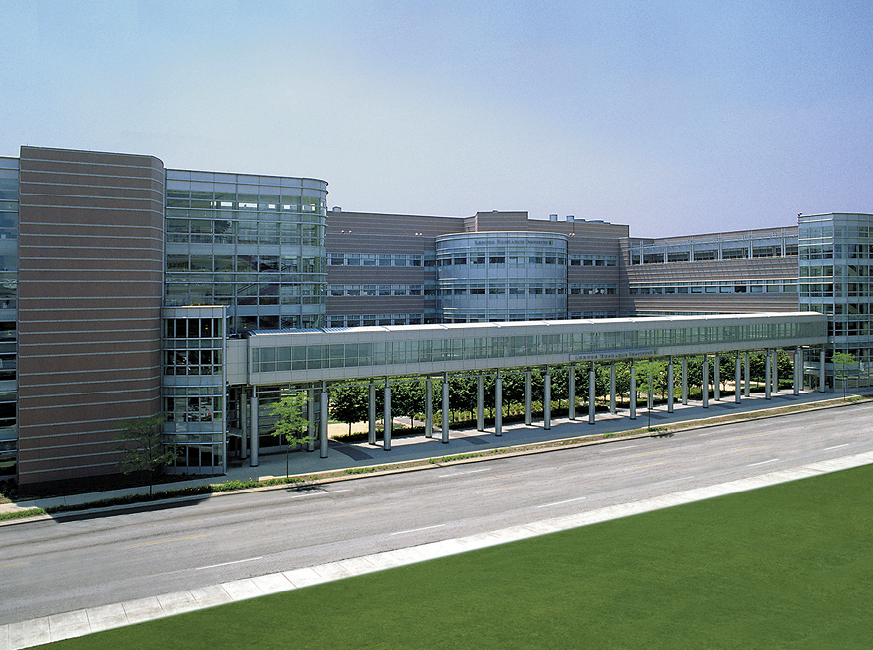- Home
- Media Kit
- MediaJet
- Current Issue
- Past Issues
- Ad Specs-Submission
- Reprints (PDF)
- Photo Specifications (PDF)
- Contact Us
- PRIVACY POLICY
- TERMS OF USE
![]()
ONLINE
![]()
ONLINE

Putting Patients First
Editors’ Note
Dr. Lara Jehi is professor of neurology at Cleveland Clinic Lerner College of Medicine, and Chief Research Information Officer for the Cleveland Clinic Health System. In this role, she works closely with information technology, research, finance, and other departments to organize and optimize the Cleveland Clinic’s digital infrastructure and computational research strategy to better support research activities and accelerate new treatments for patients. She is the principal investigator of Cleveland Clinic’s Bio-repository, and the Executive Program Lead for the Discovery Accelerator, a strategic partnership between Cleveland Clinic and IBM to accelerate research and innovation leveraging high performance computing, artificial intelligence and quantum computing. She is the Chair of Cleveland Clinic’s Center for Computational Life Sciences, and Chair of Cleveland Clinic’s Data Advisory Council. She chairs several key commissions in national and international professional societies, has more than 200 peer-reviewed publications, 10 book chapters, and is a regular reviewer for NIH study sections. In addition to her medical training in epilepsy, she holds a master’s degree in healthcare delivery science from Dartmouth College.
Institution Brief
Cleveland Clinic (clevelandclinic.org) is a nonprofit multispecialty academic medical center that integrates clinical and hospital care with research and education. Located in Cleveland, Ohio, it was founded in 1921 by four renowned physicians with a vision of providing outstanding patient care based upon the principles of cooperation, compassion, and innovation. Cleveland Clinic has pioneered many medical breakthroughs, including coronary artery bypass surgery and the first face transplant in the United States. Cleveland Clinic is consistently recognized in the U.S. and throughout the world for its expertise and care. Among Cleveland Clinic’s 77,000 employees worldwide are more than 5,650 salaried physicians and researchers, and 19,000 registered nurses and advanced practice providers, representing 140 medical specialties and subspecialties. Cleveland Clinic is a 6,699-bed health system that includes a 173-acre main campus near downtown Cleveland, 23 hospitals, more than 275 outpatient facilities, including locations in northeast Ohio; southeast Florida; Las Vegas, Nevada; Toronto, Canada; Abu Dhabi, UAE; and London, England. In 2022, there were 12.8 million outpatient encounters, 303,000 hospital admissions and observations, and 270,000 surgeries and procedures throughout Cleveland Clinic’s health system. Patients came for treatment from every state and 185 countries.

Cleveland Clinic main campus
What have been the keys to Cleveland Clinic’s industry leadership?
We are an institution that is very clear about its North Star, which has always been putting patients first. This commitment goes for the person who cleans the hallways to the C-suite. Our decision-making, our behavior, and our engagement are all driven by a focus on the patient. This shapes our commitment to research, innovation, and discovery, because as one of the founding fathers of Cleveland Clinic said, our responsibility is to take care of the patients of today, and also to focus on the patients of tomorrow.
The one common thread that binds everything we do at Cleveland Clinic is putting patients first.
Will you discuss your role and areas of focus?
My overall vision for research at Cleveland Clinic has three pillars: first is building our assets for research; second is enabling and growing those assets; and third is transformative partnerships with the community, policymakers, and other institutions to translate what we discover.
I am still a clinician, as you can tell from the white coat I am wearing. This week happens to be hospital service week which means I take care of patients in the hospital. This is important for me even though I have a lot of responsibilities in administration and research, since being with patients keeps me grounded. I also spend a lot of my time developing programs, such as the biorepository for the health system.
“Our decision-making, our behavior, and our engagement are all driven by a focus on the patient. This shapes our commitment to research, innovation, and discovery, because as one of the founding fathers of Cleveland Clinic said, our responsibility is to take care of the patients of today, and also to focus on the patients of tomorrow.”
How important is close coordination and collaboration within Cleveland Clinic for its research efforts?
This is key and nothing replaces it. A main differentiator for Cleveland Clinic in research is that we are a clinic so the translation of a bench researcher’s idea into something that can make a difference in the lives of patients is seamless, compared to the more traditional siloed approach where often the research happens in a university, and then there is the hospital which is a separate entity, and these two entities don’t communicate.
Cleveland Clinic is unique because the research organization and the hospital are one entity – we are all Cleveland Clinic. This makes the process of administering research much easier. The research teams that are successful talk and collaborate, and it is critical that we work together to meet our goals.
Cleveland Clinic is a global organization, and we have a presence in London, Abu Dhabi, Canada, as well as other parts of the United States besides Ohio, and coordination is critical across our global footprint. It is not just about what happens in Cleveland – all of these locations have as much to bring in terms of research as we do in Cleveland. We are continuing to build an operating model that allows us to work closely together globally in our research efforts.

Lerner Research Institute
Research is a continuous effort with no end. How important is it to take moments to pause and celebrate the successes along the way?
Research is about repeating – doing things over and over again. This can be frustrating to someone who is focused on getting an answer, as opposed to the process. In research, you never think your answer is good enough and we are constantly focused on making it better, always learning from our mistakes and looking forward. It is very important to pause at times to celebrate what we have done, since this rejuvenates you and excites you about continuing your work.
It is important for leaders of the organization to set the tone and make it acceptable to take those moments to celebrate, and to acknowledge the work of the team. I try to do this regularly with my group, since it takes the entire team to be successful.
Do you feel that there are strong opportunities for women in leadership roles in the industry?
There has definitely been progress, but we are not there yet. It really varies among institutions. I remember when I joined Cleveland Clinic in the early 2000s to do my residency, there were no women on the executive team. I would look up and it was all men. Now, 24 years later, our enterprise chief of staff, Beri Ridgeway, is a woman; our chief caregiver officer, Kelly Hancock, is a woman; our chief research and academic officer, Serpil Erzurum, is a woman; and there are many other women leaders in the institution. This is uplifting and a clear demonstration of visionary leadership at Cleveland Clinic.
While there clearly has been progress, it does take women longer to get to the same place that men do. I have always felt that if we want to get more women into leadership positions, we just need to “get more women in leadership positions.” It is easier for them to see the potential in women like them and pull them up too, creating a virtuous cycle. My hope is for a time where the best person for a job gets it, regardless of whether they are a man or a woman, and this becomes a non-issue in the decision-making process.
What advice do you offer to young people interested in pursuing a career in medicine?
The most important thing is to focus on your craft, be open, and don’t shy away from taking chances. To be successful in medicine, you need to be passionate about it because that will fuel the energy necessary for the hard work and dedication required to succeed. You need to wake up in the morning excited to go to work and excited to put in the hours. You need to be as excited about the success of others as you are about yours in order to build a great team, and be a great team-member yourself. Medicine is such a fulfilling profession since there is nothing more gratifying than making a difference in a patient’s life.![]()